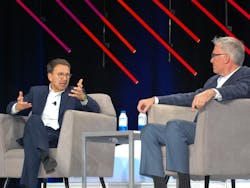It’s always nice to travel with someone who knows a new town or the local terrain—and the metaverse and its neighboring ecosystems are no exception. So, as part of his opening address on the third day of Rockwell Automation Fair 2023 this week, chairman and CEO Blake Moret held a wide-ranging discussion with Judson Althoff, chief commercial officer at Microsoft, about artificial intelligence (AI), generative AI, ChatGPT and other forms of digitalization that Rockwell Automation is quickly turning to its advantage the benefit of its customers.
“The industrial metaverse can have real-world impacts on manufacturing to build better products and processes,” said Althoff. “The metaverse is the culmination of combining technologies that can simulate any manufacturing request and do it in the cloud or elsewhere.” Althoff added that Microsoft has seen measurable performance gains from using generative AI. These were achieved in 13-week engagements, where Microsoft moved into brownfield and greenfield applications in plants, and improved sensing, reduced use of resources, and achieved other gains.
“This isn’t just the hype cycle, and if you don’t engage, you’ll likely fall behind,” said Althoff. “A year ago, many people were treating generative AI like black magic and hogwash. However, that disbelief quickly turned to fear because three months ago, they were all saying ‘the AI robots are taking over the world!’ Now, many users are coming in with hundreds of ideas about what they can do with generative AI and ChatGPT, whether it’s individual productivity or democratizing, data.”
Consequently, Althoff reported that Microsoft is integrating generative AI into all its products. It’s even using generative AI to write its own code, so it can get those products to market quicker. Likewise, Moret added that Rockwell Automation is adding generative AI copilots to its configurations and other tools.
“We’re adding generative AI copilots because they can augment our users, open up the platforms and ecosystems they need to reach, and let them and their partners co-innovate, using software like Rockwell Automation’s FactoryTalk Design Studio,” explained Althoff. “No one joins these technical fields just to learn syntax, so it helps if they can ask their software directly for help. This unlocks a lot of user joy.”
Generative AI just getting started
To further enable inclusive collaboration, Moret and Althoff reported that generative AI can even enable joint design reviews that include copilots in Teams meetings. “We’ve used ladder logic for decades to understand relays, but many recent graduates, don’t know it,” added Moret. “Generative AI will allow more users to understand what automation is about, and perhaps consider working with controllers and automation as their careers.”
For example, Althoff added that the large-language models (LLM) that generative AI is based on enables less-experienced users to interact with it more easily using the spoken words they’re used to. “We’re unlocking power of the prompt,” added Althoff. “Frontline workers hold all the golden expertise about how things really get done, and deal with a lot of complexity. Now, they can pull out a mobile device, take a picture and tell the software it’s not working. The software will then access a recursive knowledge base and provide recommendations and solutions in the language that workers know best.”
“Generative AI is really a call to action for everyone because it can change employees’ experiences and bend the curve on innovation,” concluded Althoff. “We took the suggestion of our own staffers, and used AI to help answer complex questions to further build its expertise. We even took $100 million off our support organization’s expenses, while still increasing customer satisfaction. This means anyone can ask generative AI how to help their employees, and they’ll get an answer.”


